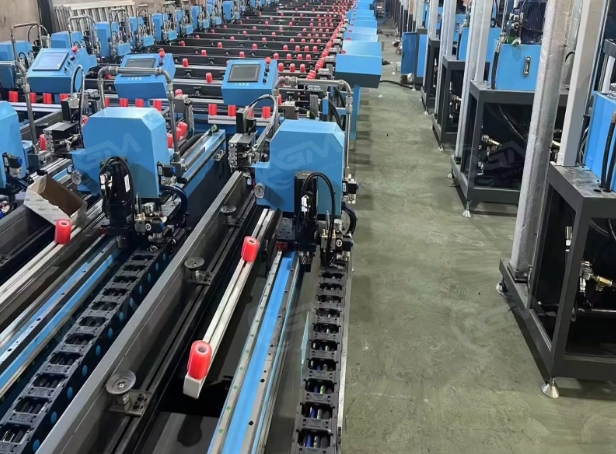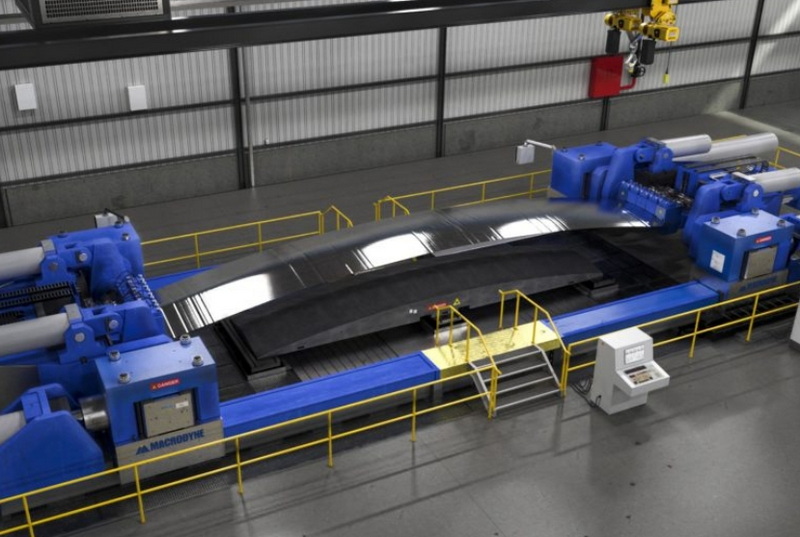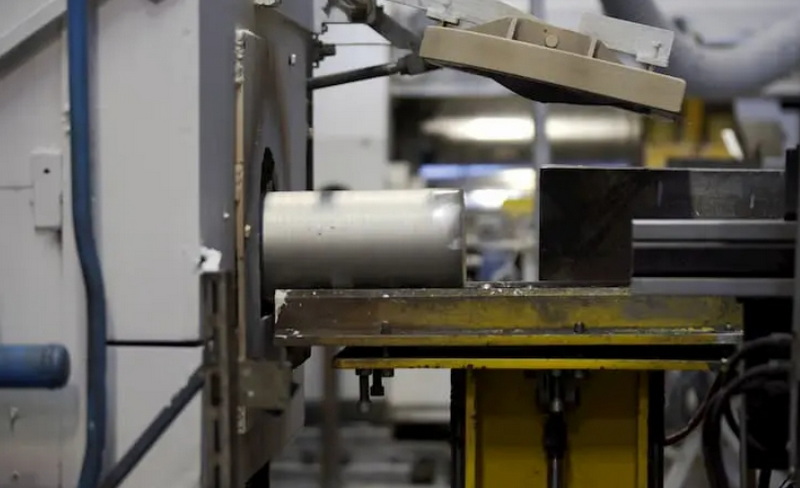Content Menu
● Understanding Extrusion Equipment and Its Importance
● Key Factors to Consider When Choosing an Extrusion Equipment Supplier
>> 1. Supplier Experience and Industry Reputation
>> 2. Technical Capabilities and Customization
>> 3. Manufacturing Facilities and Quality Control
>> 4. Material Expertise and Supply Chain Integration
>> 5. Production Capacity and Scalability
>> 6. Post-Sales Support and Service
>> 7. Cost Structure and Return on Investment
>> 8. Communication and Customer Service
● Step-by-Step Process for Selecting the Right Extrusion Equipment Supplier
>> Step 1: Define Your Requirements
>> Step 2: Research and Shortlist Suppliers
>> Step 3: Evaluate Supplier Capabilities
>> Step 4: Ask the Right Questions
>> Step 5: Compare Proposals and Negotiate
>> Step 6: Conduct Final Due Diligence
>> Step 7: Make Your Selection and Formalize the Agreement
● Common Pitfalls to Avoid
● Best Practices and Pro Tips
● Conclusion
● Frequently Asked Questions (FAQ)
>> 1. What information should I provide to an extrusion equipment supplier to get an accurate quote?
>> 2. How can I verify the quality and reliability of an extrusion equipment supplier?
>> 3. What post-sales services should I expect from a top-tier extrusion equipment supplier?
>> 4. How do I ensure the extrusion equipment will meet my future production needs?
>> 5. What are the most important questions to ask when evaluating an extrusion equipment supplier?
● Citations:
Selecting the right extrusion equipment supplier is a pivotal decision for any manufacturing business involved in plastics, aluminum, or other material extrusion processes. The right partner can ensure consistent product quality, reliable delivery, technical support, and long-term business growth, while the wrong choice can lead to costly delays, subpar products, and operational headaches. With a crowded marketplace and a wide range of offerings, understanding how to evaluate and choose the best extrusion equipment supplier is essential for your business's success.
This comprehensive guide will walk you through the critical factors to consider, the questions you need to ask, and the best practices for selecting an extrusion equipment supplier that aligns with your business goals and operational requirements.

Understanding Extrusion Equipment and Its Importance
Extrusion is a manufacturing process used to create objects of a fixed cross-sectional profile by pushing material through a die. The equipment used—extruders, dies, cooling systems, and downstream machinery—directly impacts the quality, consistency, and cost of your products[12][14]. Whether you're producing plastic pipes, aluminum profiles, or custom components, the capabilities and reliability of your extrusion equipment supplier play a central role in your production efficiency and product quality.
Key Factors to Consider When Choosing an Extrusion Equipment Supplier
1. Supplier Experience and Industry Reputation
- Track Record: Seek suppliers with a proven history in your specific industry. A company with years of experience is more likely to understand the nuances of your applications and deliver reliable solutions[1][4][7].
- Reputation and References: Research customer feedback, industry reputation, and ask for references. Reliable extrusion equipment suppliers are transparent about their track record and eager to share success stories[7][10].
2. Technical Capabilities and Customization
- Range of Equipment: Ensure the supplier offers the types of extruders and ancillary equipment suited to your materials (e.g., plastics, aluminum) and production needs (single screw, twin screw, co-extrusion, etc.)[14][12].
- Customization: Your supplier should be able to tailor equipment and solutions to your specific product dimensions, tolerances, and finishing requirements[4][8].
- Design Support: Leading suppliers provide engineering support to optimize your designs for manufacturability and cost-effectiveness[4].
3. Manufacturing Facilities and Quality Control
- Facility Assessment: Visit or request detailed information about the supplier's manufacturing facilities. State-of-the-art equipment and robust manufacturing processes are indicative of a supplier's ability to deliver high-precision, consistent products[4][11].
- Quality Assurance: Investigate the supplier's quality control procedures and certifications (e.g., ISO9001, CE, UL). Consistent quality checks and adherence to industry standards are non-negotiable[4][6].
4. Material Expertise and Supply Chain Integration
- Material Options: The supplier should have access to a broad range of raw materials and alloys to meet your specific product requirements[4][13].
- Supply Chain Reliability: A strong supplier manages its own supply chain or has reliable partners, minimizing risks of material shortages or delays[2].
5. Production Capacity and Scalability
- Volume Handling: Assess whether the supplier can handle your current and future production volumes. Look for flexibility to scale up as your business grows[11][12].
- Lead Times: Reliable extrusion equipment suppliers provide clear, realistic lead times and have a track record of on-time delivery[3][11].
6. Post-Sales Support and Service
- Installation and Training: Top suppliers offer installation, commissioning, and comprehensive operator training to ensure smooth startup and ongoing operation[2][14].
- Technical Support: Evaluate the supplier's after-sales service, including the availability of spare parts, maintenance, and troubleshooting support. Quick response times and local support are major advantages[9][14].
- Warranty and Maintenance: Understand the warranty terms and the supplier's commitment to ongoing maintenance and support[2][5].
7. Cost Structure and Return on Investment
- Transparent Pricing: Insist on a clear breakdown of costs, including equipment, installation, training, and any ongoing service fees[4].
- Value Over Price: Focus on overall value—performance, durability, efficiency, and support—rather than just the lowest upfront price[14].
- ROI Considerations: Evaluate the total cost of ownership, including expected lifespan, energy efficiency, and potential for future upgrades[14][12].
8. Communication and Customer Service
- Responsiveness: The supplier should be responsive, communicative, and proactive in addressing your needs and concerns[4][11].
- Dedicated Account Management: A single point of contact can streamline communication and project management[4].

Step-by-Step Process for Selecting the Right Extrusion Equipment Supplier
Step 1: Define Your Requirements
- Clearly outline your product specifications, material needs, production volumes, and any special requirements (e.g., certifications, finishing options)[8][14].
Step 2: Research and Shortlist Suppliers
- Use industry directories, online research, and referrals to compile a list of potential extrusion equipment suppliers.
- Focus on suppliers with experience in your industry and the technical capabilities to meet your needs[7][13].
Step 3: Evaluate Supplier Capabilities
- Review supplier websites for information on equipment range, technical expertise, certifications, and case studies[13].
- Request detailed proposals and, if possible, visit their facilities[4][11].
Step 4: Ask the Right Questions
- What industries do you serve, and do you have experience with my application?
- What is your on-time delivery rate?
- Can you customize equipment to my specifications?
- What certifications and quality controls do you have?
- What after-sales support do you provide?
- What are your lead times and warranty terms?
- Can you provide references from similar projects?[3][6][9]
Step 5: Compare Proposals and Negotiate
- Compare supplier proposals based on technical fit, service offerings, pricing, and support.
- Negotiate terms, focusing on value-added services, support, and long-term partnership potential[4][10].
Step 6: Conduct Final Due Diligence
- Check references and customer reviews.
- Assess financial stability and long-term viability of the supplier[11].
Step 7: Make Your Selection and Formalize the Agreement
- Choose the supplier that best aligns with your business needs and offers the most value.
- Ensure all terms—technical, commercial, and support—are clearly defined in the contract.
Common Pitfalls to Avoid
- Choosing Solely on Price: Low-cost suppliers may cut corners on quality, support, or delivery reliability[4].
- Ignoring After-Sales Support: Lack of technical support can lead to costly downtime and operational issues[9][14].
- Overlooking Customization Needs: Standard equipment may not meet your specific requirements, leading to inefficiencies or product issues[8].
- Failing to Assess Scalability: Outgrowing your supplier's capabilities can disrupt your business as you expand[12].
- Neglecting Communication: Poor communication can result in misunderstandings, delays, and project failures[4].
Best Practices and Pro Tips
- Engage Early: Involve your extrusion equipment supplier early in the product development process for design optimization and cost savings[4][6].
- Request Pilot Runs or Samples: Before committing, ask for test runs or samples to validate equipment performance and product quality[13].
- Plan for Growth: Select a supplier with scalable solutions and a track record of supporting growing businesses[12].
- Prioritize Long-Term Partnerships: Building a strong, collaborative relationship with your supplier can yield ongoing benefits in innovation, support, and cost efficiency[1][4].
Conclusion
Choosing the right extrusion equipment supplier is a strategic decision that will impact your business's production efficiency, product quality, and long-term growth. By thoroughly assessing potential suppliers based on their experience, technical capabilities, quality control, support services, and alignment with your business needs, you can forge a partnership that drives your business forward. Remember to look beyond price, prioritize value and support, and always plan for the future. With the right extrusion equipment supplier by your side, your business will be well-positioned for sustained success in a competitive marketplace.

Frequently Asked Questions (FAQ)
1. What information should I provide to an extrusion equipment supplier to get an accurate quote?
To receive an accurate quote, provide detailed information about your product specifications (dimensions, material type, required tolerances), desired production capacity, any special finishing or secondary operations, and your expected order volumes. Supplying drawings, photos, or samples can also help the supplier understand your requirements[2][8].
2. How can I verify the quality and reliability of an extrusion equipment supplier?
Check for industry certifications (such as ISO9001, CE, or UL), ask for references from similar projects, and review customer testimonials. Visiting the supplier's facilities and reviewing their quality control processes can also provide insight into their reliability and commitment to quality[4][6][13].
3. What post-sales services should I expect from a top-tier extrusion equipment supplier?
Expect comprehensive post-sales support, including installation and commissioning, operator training, regular maintenance, prompt technical assistance, and readily available spare parts. Some suppliers also offer remote troubleshooting and ongoing process optimization[2][9][14].
4. How do I ensure the extrusion equipment will meet my future production needs?
Discuss scalability and flexibility with your supplier. Choose equipment that can be upgraded or expanded, and ensure the supplier has a track record of supporting businesses as they grow. Consider modular systems or equipment with adaptable features[12][14].
5. What are the most important questions to ask when evaluating an extrusion equipment supplier?
1. Do you have experience with my industry and product type?
2. What is your on-time delivery performance?
3. What certifications and quality controls do you have?
4. What after-sales support and training do you offer?
5. Can you provide references from similar projects?
These questions will help you assess the supplier's technical fit, reliability, and commitment to customer satisfaction[3][6][9].
Citations:
[1] https://paulmurphyplastics.com/industry-news-blog/what-is-plastic-extrusion-and-how-to-select-the-best-manufacturing-partner/
[2] https://www.jwellextrusions.com/faq/
[3] https://profileprecisionextrusions.com/5-initial-questions-ask-aluminum-extruder/
[4] https://www.alcirclebiz.com/blogs/finding-the-best-aluminium-extrusion-supplier-7-key-factors
[5] https://www.trustymachine.com/faq.html
[6] https://www.minalex.com/2021/10/29/10-questions-ask-aluminum-extruder/
[7] https://kmcaluminium.com/how-to-choose-the-best-aluminium-extrusion-manufacturer/
[8] https://customprofiles.com/three-questions-to-make-sure-a-plastic-extrusion-supplier-can-provide-the-part-you-need/
[9] https://www.insta-pro.com/en/blog/businessstrategyandfinance/purchasing-equipment-some-questions-to-ask-your-supplier/
[10] https://rpmindinc.com/follow-the-checklist-before-choosing-aluminum-extrusion-suppliers/
[11] https://www.goodfishgroup.com/plastic-extrusion-company
[12] https://www.adremac.com/the-importance-of-choosing-the-right-extruder-for-your-business/
[13] https://profileprecisionextrusions.com/choosing-an-aluminum-extrusion-manufacturer-partner/
[14] https://www.taizhengmachine.com/Howtochoosetherightplasticextrudermachine.html
[15] https://www.fareastnetwork.co.jp/en/extruder/choosing-an-extruder-manufacturer-a-guide-with-a-comprehensive-list/
[16] https://www.bausano.com/en/press-and-news/are-there-objective-parameters-to-choose-the-right-machine
[17] https://www.inplexllc.com/blog/plastic-extrusion-faq/
[18] https://extruderpress.com/faqs/
[19] https://www.arlingtonmachinery.com/blog/p.220602001/top-5-questions-to-ask-when-purchasing-used-plastics-machinery/
[20] https://www.plasticstoday.com/plastics-processing/ask-the-extrusion-expert-your-plastics-and-processing-questions-answered
[21] https://www.plastar-machine.com/en/news/faq.html
[22] https://www.polystarco.com/blog-detail/frequently-asked-questions-about-blown-film-machines/
[23] https://plasticstouchpoint.com/faq/
[24] https://www.sanfoundry.com/mechanical-metallurgy-questions-answers-extrusion-equipments/
[25] https://www.cowinextrusion.com/all-about-plastic-extrusion-and-helpful-tips-for-buying-extruder-machinery/
[26] https://testbook.com/objective-questions/mcq-on-extrusion--5eea6a0d39140f30f369e2ec
[27] https://www.macocorporation.com/blog/extruder-machine/
[28] https://spectraaluminum.com/frequently-asked-questions-about-aluminum-extrusion/
[29] https://www.seagateplastics.com/frequently-asked-questions/






















